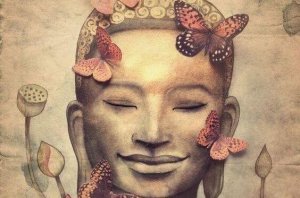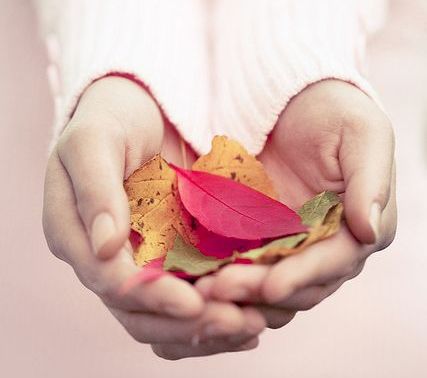Every Day There Is Something to Forgive, Learn and Give Thanks For

Knowing how to give thanks, being able to learn and allow ourselves to forgive certain things is not only the foundation of many philosophies and religions. It is the key to mental well-being. Techniques such as “emotional freedom” for example, emphasize the need to feel free, not cling to negative emotions, to be able to appreciate what we are and to keep learning and experiencing.
Ignorant is he who sees beyond his obsessions, who is not able to forgive in order to be free from suffering, and refuses to learn from the simple things to enrich his soul.
We are constantly subjected to this mental noise that prevents us from prioritizing what is important. Anxiety, stress or habits of postponing happiness to “when I have, when I am, when I get” prevent us from seeing these dimensions which should be the score of our daily melody.
We invite you to reflect on gratitude, forgiveness, and the ability to learn.
Forgiving is good for the brain

Forgiveness is an act of courage that we cannot always perform. We tend to interpret forgiveness as an act of surrender, when in fact, it is a form of emotional liberation where we stop being captives of what hurt us. It is a way to break the bond of pain and closing chapters.
Robert Alder is a pioneer of “psychoneuroimmunology” and explains that there is a close relationship between emotions and health, to the extent that the act of storing resentment, anger or frustration directly affects our immune system: we are more vulnerable to disease.
Negative emotions particularly affect our autonomic nervous system, which govern the involuntary body functions. Resentment, like stress, elevates adrenaline, noradrenaline and cortisol in the blood by blocking the functions of cells that defend the body.
Forgiveness is the greatest act we can do for our health and emotional balance. It is about cutting away from bitterness to open doors to new opportunities.
Between Aruging and Being Happy, I Prefer To Be Happy
It is not about never arguing, but rather knowing when to choose the reasons that make it worth doing and the reasons for…See more »
The ability to learn to adapt better

Learning is not accumulating information, dates or memorizing. Learning is the act of moving as a person to reinvent ourselves every day to adapt to our environment better . Whoever is rigid in their thinking patterns can never see beyond the frame of their own glasses.
Learning is discovering something new every day to improve as a person, to recognize mistakes and overcome them, to admit that outside approaches can be as valid as our own.
According to two studies conducted at the University of La Rioja, the higher the brain activity developed throughout our life, the better we face old age and any possible dementia.
Existence is a continuous learning experience that we must embrace with enthusiasm and mental and emotional openness. Learn something new every day, just so you’ll mature, “bloom” and improve in order to approach that ideal person who is inside of you waiting to emerge.

The virtue of being thankful
In 2003, Emmons and McCullough conducted an interesting study in which a group of people were asked to write down what they were grateful throughout the day in a book for a few months . Another group, was asked to reflect on all the negative things they experienced throughout their day.
The results were significant: people who are able to appreciate and give thanks for everything that surrounds them have a full and satisfying life. This is not only about being able to acknowledge the acts that others do for us. The art of being grateful is also the virtue of seeing ourselves in a positive way.
Appreciation also has its benefits in our brain: feelings of stress and anxiety are reduced, we enjoy a better quality of sleep and even a decreased risk of depression.
Giving thanks is appreciating what we have and what we are. It is initiating a virtuous circle where we put aside negative emotions and allow ourselves to be more responsive to the simplicity of our environment and personal relationships.
We almost always think about what we need, what we have, and what we lost when we should actually be giving thanks for what we have and move forward without rancor by allowing ourselves to learn every day with enthusiasm with those around us.

Namaste, The Value of Gratitude and Recognition
Namaste is much more than a word of Sanskrit, it holds those values we should all practice: humility, gratitude and … More »
Knowing how to give thanks, being able to learn and allow ourselves to forgive certain things is not only the foundation of many philosophies and religions. It is the key to mental well-being. Techniques such as “emotional freedom” for example, emphasize the need to feel free, not cling to negative emotions, to be able to appreciate what we are and to keep learning and experiencing.
Ignorant is he who sees beyond his obsessions, who is not able to forgive in order to be free from suffering, and refuses to learn from the simple things to enrich his soul.
We are constantly subjected to this mental noise that prevents us from prioritizing what is important. Anxiety, stress or habits of postponing happiness to “when I have, when I am, when I get” prevent us from seeing these dimensions which should be the score of our daily melody.
We invite you to reflect on gratitude, forgiveness, and the ability to learn.
Forgiving is good for the brain

Forgiveness is an act of courage that we cannot always perform. We tend to interpret forgiveness as an act of surrender, when in fact, it is a form of emotional liberation where we stop being captives of what hurt us. It is a way to break the bond of pain and closing chapters.
Robert Alder is a pioneer of “psychoneuroimmunology” and explains that there is a close relationship between emotions and health, to the extent that the act of storing resentment, anger or frustration directly affects our immune system: we are more vulnerable to disease.
Negative emotions particularly affect our autonomic nervous system, which govern the involuntary body functions. Resentment, like stress, elevates adrenaline, noradrenaline and cortisol in the blood by blocking the functions of cells that defend the body.
Forgiveness is the greatest act we can do for our health and emotional balance. It is about cutting away from bitterness to open doors to new opportunities.
Between Aruging and Being Happy, I Prefer To Be Happy
It is not about never arguing, but rather knowing when to choose the reasons that make it worth doing and the reasons for…See more »
The ability to learn to adapt better

Learning is not accumulating information, dates or memorizing. Learning is the act of moving as a person to reinvent ourselves every day to adapt to our environment better . Whoever is rigid in their thinking patterns can never see beyond the frame of their own glasses.
Learning is discovering something new every day to improve as a person, to recognize mistakes and overcome them, to admit that outside approaches can be as valid as our own.
According to two studies conducted at the University of La Rioja, the higher the brain activity developed throughout our life, the better we face old age and any possible dementia.
Existence is a continuous learning experience that we must embrace with enthusiasm and mental and emotional openness. Learn something new every day, just so you’ll mature, “bloom” and improve in order to approach that ideal person who is inside of you waiting to emerge.

The virtue of being thankful
In 2003, Emmons and McCullough conducted an interesting study in which a group of people were asked to write down what they were grateful throughout the day in a book for a few months . Another group, was asked to reflect on all the negative things they experienced throughout their day.
The results were significant: people who are able to appreciate and give thanks for everything that surrounds them have a full and satisfying life. This is not only about being able to acknowledge the acts that others do for us. The art of being grateful is also the virtue of seeing ourselves in a positive way.
Appreciation also has its benefits in our brain: feelings of stress and anxiety are reduced, we enjoy a better quality of sleep and even a decreased risk of depression.
Giving thanks is appreciating what we have and what we are. It is initiating a virtuous circle where we put aside negative emotions and allow ourselves to be more responsive to the simplicity of our environment and personal relationships.
We almost always think about what we need, what we have, and what we lost when we should actually be giving thanks for what we have and move forward without rancor by allowing ourselves to learn every day with enthusiasm with those around us.

Namaste, The Value of Gratitude and Recognition
Namaste is much more than a word of Sanskrit, it holds those values we should all practice: humility, gratitude and … More »
This text is provided for informational purposes only and does not replace consultation with a professional. If in doubt, consult your specialist.







